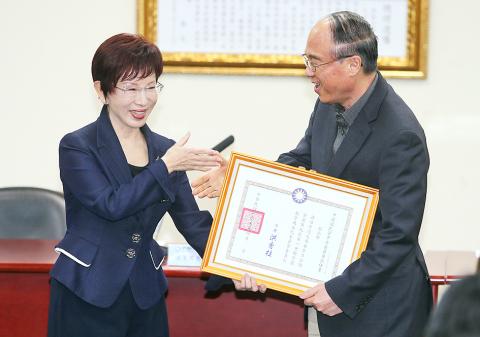Chinese Nationalist Party (KMT) Chairwoman Hung Hsiu-chu (洪秀柱) yesterday rebuffed the KMT caucus’ call for the caucus to elect its own general convener as caucus whip, saying that the person elected by the caucus “would be the deputy executive director of the party’s policy committee,” a position that would be under the leadership of the party-assigned policy committee’s chief executive director, who is conventionally the KMT caucus whip.
The KMT caucus proposed before the KMT chairperson by-election on March 26 to set up a new caucus position of “general convener” to double as the caucus whip, who is to be elected from among KMT lawmakers.
The move by the caucus has been seen as one that aims to hollow out the power of the party headquarters.

Photo: CNA
Hung said during the KMT Central Standing Committee meeting yesterday that she supports the establishment of a new position, but the elected convener would be “ex officio policy committee deputy executive director,” who would thereby be under the leadership of the KMT policy committee’s chief executive director, who doubles as the KMT caucus whip by convention.
“The legislature is composed of elected representatives who have the responsibility to oversee the government. The party’s think tank [the policy committee] would not only be the shadow Cabinet, but also an ammunition depot for the party lawmakers to do their job with better information,” Hung said. “The general convener elected by the caucus would be ex officio deputy executive director of the policy committee, which would bind the party, the think tank and the caucus closely together and maximize the party’s performance in the legislature.”
Hung said the Democratic Progressive Party now holds a majority in the legislature and the presidency, rendering the KMT as “utterly an opposition party.”
“We have only 35 seats left in the legislature and it would rely on their performance for the party to act as a loyal opposition party. The legislature would also be the place for the party to remake its image for the public to trust us,” Hung said.
In the Central Standing Committee meeting, the party-assigned caucus officials were officially endorsed.
KMT Legislator Lin Te-fu (林德福) remains as the caucus secretary-general, or conventionally the “small” caucus whip, as opposed to the “large” caucus whip, who is the chief executive director of the policy committee.
Jonny Chiang (江啟臣) is the first deputy secretary-general, with Alicia Wang (王育敏), Hsu Shu-hua (許淑華) and Lee Yan-hsiu (李彥秀) being appointed as deputy secretaries-general.

Taiwan is stepping up plans to create self-sufficient supply chains for combat drones and increase foreign orders from the US to counter China’s numerical superiority, a defense official said on Saturday. Commenting on condition of anonymity, the official said the nation’s armed forces are in agreement with US Admiral Samuel Paparo’s assessment that Taiwan’s military must be prepared to turn the nation’s waters into a “hellscape” for the Chinese People’s Liberation Army (PLA). Paparo, the commander of the US Indo-Pacific Command, reiterated the concept during a Congressional hearing in Washington on Wednesday. He first coined the term in a security conference last

DEFENSE: The National Security Bureau promised to expand communication and intelligence cooperation with global partners and enhance its strategic analytical skills China has not only increased military exercises and “gray zone” tactics against Taiwan this year, but also continues to recruit military personnel for espionage, the National Security Bureau (NSB) said yesterday in a report to the Legislative Yuan. The bureau submitted the report ahead of NSB Director-General Tsai Ming-yen’s (蔡明彥) appearance before the Foreign and National Defense Committee today. Last year, the Chinese People’s Liberation Army (PLA) conducted “Joint Sword-2024A and B” military exercises targeting Taiwan and carried out 40 combat readiness patrols, the bureau said. In addition, Chinese military aircraft entered Taiwan’s airspace 3,070 times last year, up about

A magnitude 4.3 earthquake struck eastern Taiwan's Hualien County at 8:31am today, according to the Central Weather Administration (CWA). The epicenter of the temblor was located in Hualien County, about 70.3 kilometers south southwest of Hualien County Hall, at a depth of 23.2km, according to the administration. There were no immediate reports of damage resulting from the quake. The earthquake's intensity, which gauges the actual effect of a temblor, was highest in Taitung County, where it measured 3 on Taiwan's 7-tier intensity scale. The quake also measured an intensity of 2 in Hualien and Nantou counties, the CWA said.

The Overseas Community Affairs Council (OCAC) yesterday announced a fundraising campaign to support survivors of the magnitude 7.7 earthquake that struck Myanmar on March 28, with two prayer events scheduled in Taipei and Taichung later this week. “While initial rescue operations have concluded [in Myanmar], many survivors are now facing increasingly difficult living conditions,” OCAC Minister Hsu Chia-ching (徐佳青) told a news conference in Taipei. The fundraising campaign, which runs through May 31, is focused on supporting the reconstruction of damaged overseas compatriot schools, assisting students from Myanmar in Taiwan, and providing essential items, such as drinking water, food and medical supplies,